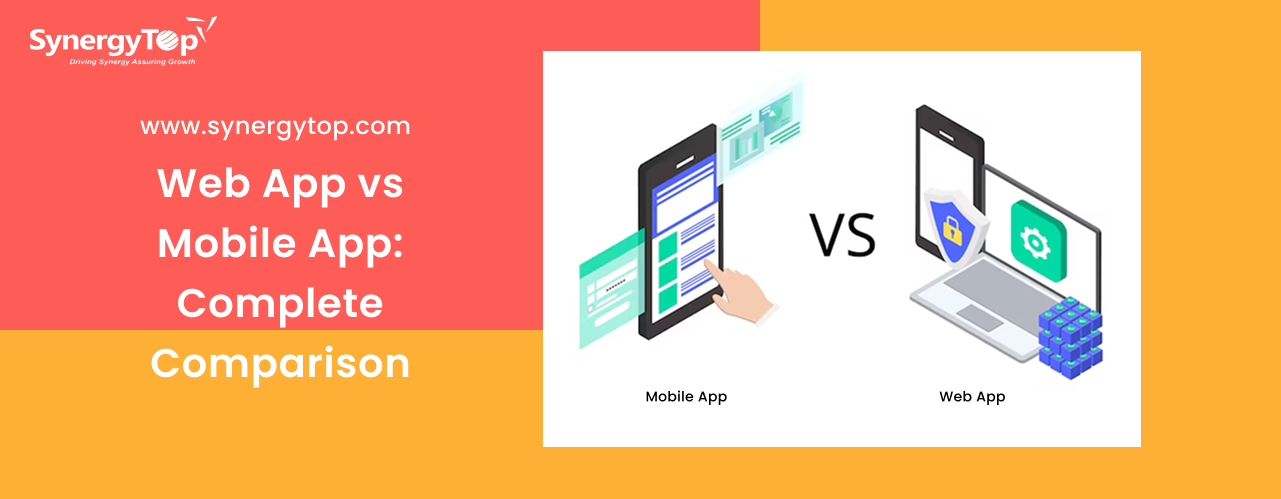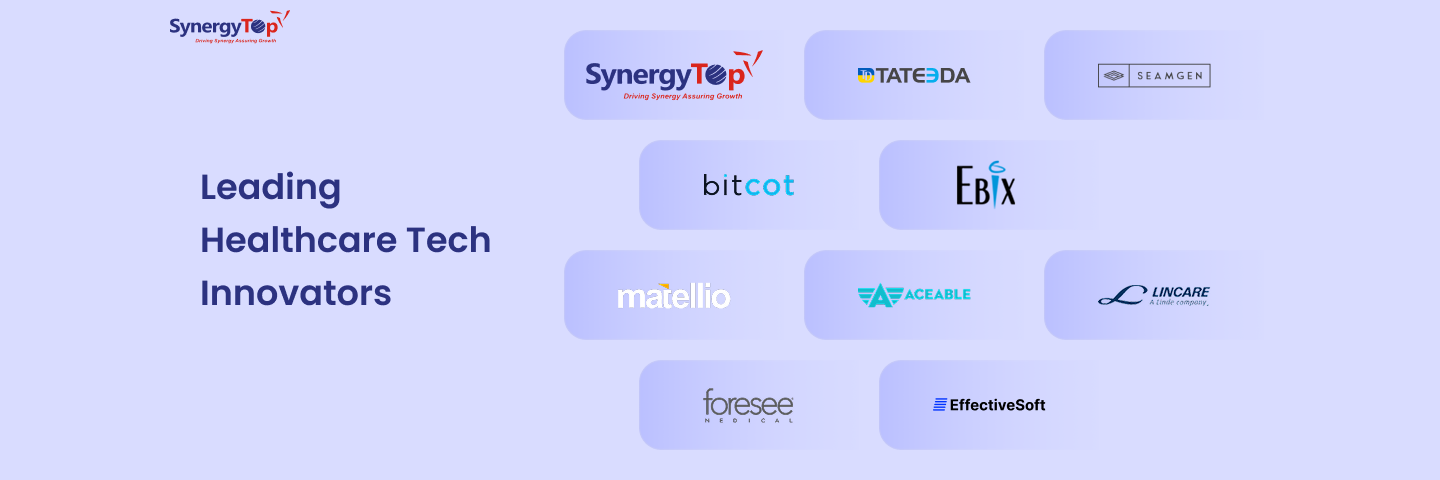In 2020, the global DevOps market was estimated to be worth USD 4,311.95 million. And with a CAGR of 18.95%, it is expected to reach USD 12,215.54 million.
That makes it very evident that DevOps isn’t a concept that will fizzle out in the near future.
As its adoption rates continue to rise and more businesses notice the various benefits that DevOps implementation offers, the transition to DevOps will fasten further.
And while IT leaders – who know the ins and outs of DevOps – are comfortable talking in DevOps jargon, business owners without a technical background find it hard to understand and adopt DevOps.
If you fall in the latter category, don’t worry. We have a complete guide for you that can help you get started with DevOps.
Read on.
What Is DevOps?
DevOps is a methodology that combines the processes of software development (Dev) and IT operations (Ops) to accelerate the delivery of new software.
The goal of DevOps is to increase collaboration and communication between these two groups so that they can work together more efficiently and effectively.
DevOps emphasizes automation and monitoring at all stages of the software development lifecycle, from integration and testing to deployment and infrastructure management. By automating the build, test, and deployment process, organizations can release software updates more quickly and with fewer errors.
Additionally, DevOps encourages the use of agile methodologies. This allows teams to respond to changing business needs more quickly and efficiently.
Overall, DevOps aims to improve the speed, quality, and stability of software delivery. And it fosters a culture of collaboration and continuous improvement within organizations.
Who Is Involved In DevOps?
DevOps involves a range of people, including software developers, IT operations professionals, and other roles that are involved in the software development process. This can include roles such as:

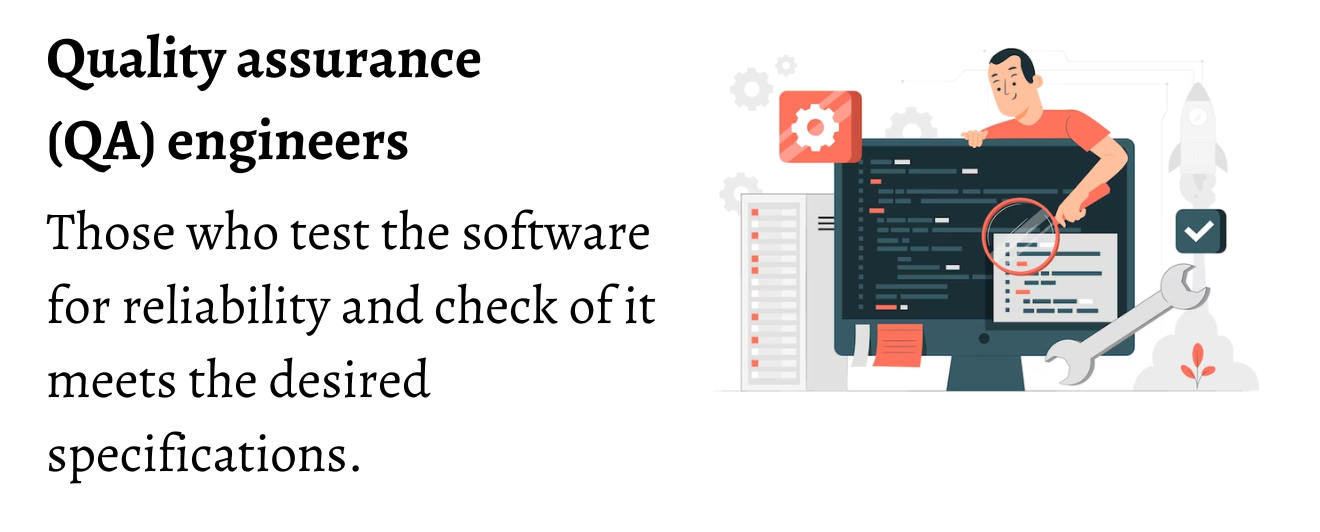
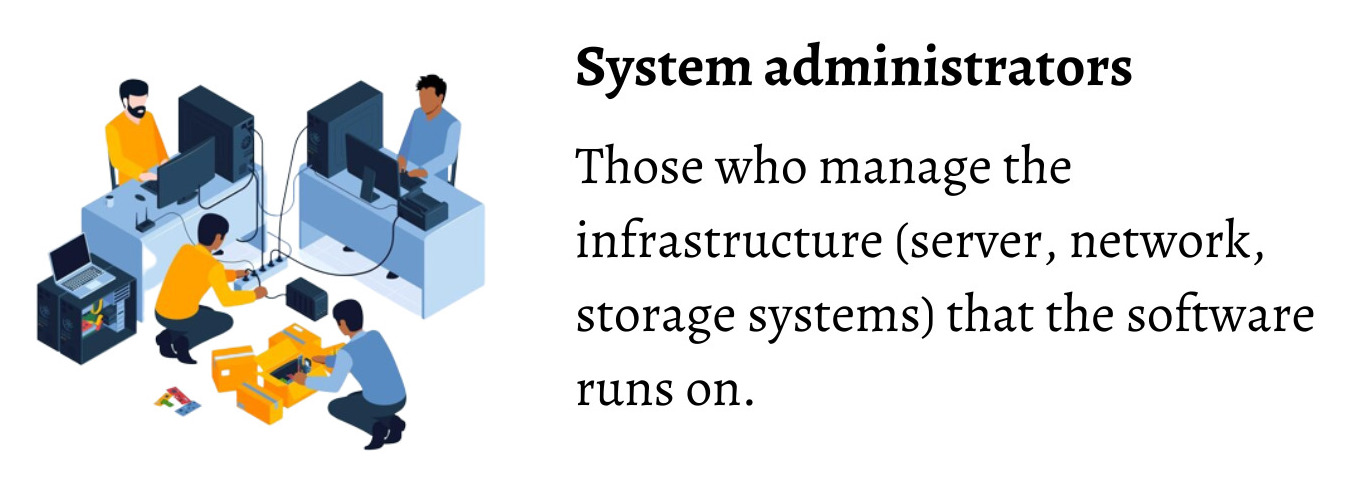
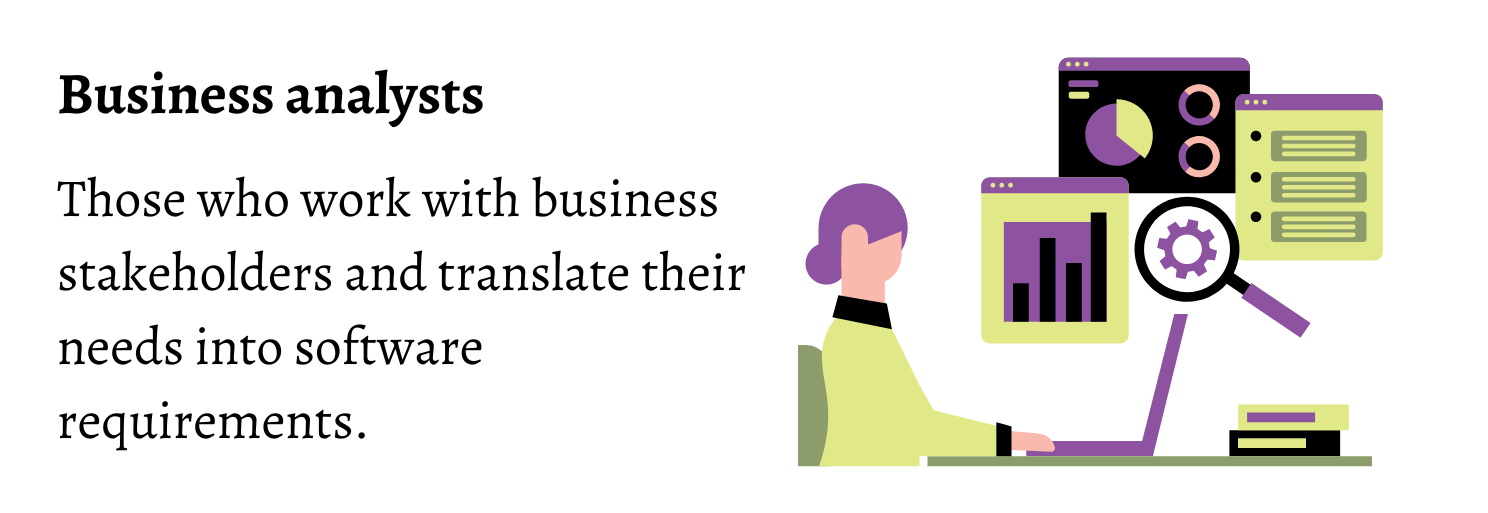

In a DevOps environment, these different roles often work closely together, collaborating on the design, development, testing, and deployment of software. This can involve sharing responsibilities and working in an agile way, with a focus on continuous delivery and iteration.
The DevOps Practices
There are many different practices that are associated with DevOps, but some of the most common ones include:
Continuous Integration (CI)
This practice involves automatically building, testing, and integrating code changes into a shared repository. This helps to catch errors and bugs early in the development process.
Continuous Delivery (CD)
This practice involves automating the process of building, testing, and deploying software updates. This allows teams to release new features and updates more quickly and with fewer errors.
Infrastructure As Code (IaC)
This practice involves using code to manage and automate the provisioning, configuration, and management of infrastructure. This allows teams to treat infrastructure in a similar way to application code, making it easier to version, rollback, and automate changes.
Monitoring and Logging
This practice involves using tools to monitor the performance and availability of systems, as well as to track and log changes and events. This helps teams to identify and troubleshoot issues more quickly.
Security
This practice involves building security into all aspects of the software development lifecycle, from design and development to testing and deployment. This helps to ensure that systems are secure and compliant with industry standards.
Collaboration and Communication
DevOps emphasizes the importance of collaboration and communication between different teams and roles. This can involve using tools like chat platforms, agile methodologies, and pair programming to encourage collaboration.
Continuous Improvement
DevOps promotes a culture of continuous improvement, in which teams are always looking for ways to optimize and streamline their processes and workflows. This can involve using metrics and data to identify areas for improvement, and experimenting with new tools and techniques to find the most effective solutions.
Key DevOps Tools
There are many different tools and techniques that are commonly used in DevOps, which can be broadly grouped into the following categories:
Version Control Systems
These are tools that allow teams to track and manage changes to code over time. Common version control systems include Git, Mercurial, and Subversion.
Continuous Integration And Delivery (CI/CD) Tools
These are tools that automate the process of building, testing, and deploying software updates. Examples include Jenkins, Bamboo, and CircleCI.
Infrastructure as Code (IaC) tools
These are tools that allow teams to define, manage, and automate the provisioning and configuration of infrastructure using code. Examples include Terraform, CloudFormation, and Ansible.
Monitoring and Logging Tools
These are tools that allow teams to monitor the performance and availability of systems, as well as to track and log changes and events. Examples include New Relic, Splunk, and Logstash.
Collaboration and Communication Tools
These are tools that allow teams to collaborate and communicate with each other in real-time, such as chat platforms like Slack and video conferencing tools like Zoom.
How To Get Started With DevOps – Key Best Practices
Here are some key best practices for getting started with DevOps:
1. Adopt An Agile Mindset
DevOps emphasizes the importance of agility and flexibility and requires a shift towards an agile mindset. This can involve using agile methodologies, such as Scrum or Kanban, to plan and execute work. It also includes embracing a culture of continuous improvement and iteration.
2. Automate Everything
Automation is a key aspect of DevOps. And it can help teams improve the speed, quality, and reliability of software delivery. Look for opportunities to automate tasks and processes throughout the development lifecycle, including testing, deployment, and infrastructure management.
3. Monitor And Measure
Monitoring and measurement are essential for continuous improvement in a DevOps environment. Use tools to monitor the performance and availability of systems. And track key metrics such as lead time, deployment frequency, and mean time to recovery.
4. Collaborate and Communicate
DevOps requires collaboration and communication across different teams and roles. Use tools like chat platforms and video conferencing to facilitate communication, and encourage team members to work together and share knowledge and skills.
5. Embrace A Culture Of Learning
DevOps is all about continuous learning and improvement. Encourage team members to experiment with new tools and techniques, and create an environment that encourages learning and growth.
6. Focus On Security
Security should be a top priority in a DevOps environment. Incorporate security best practices into the development process, and use tools like static code analysis and penetration testing to identify and address security issues.
By following these best practices, you can get started with DevOps and begin to realize the benefits of this approach to software development.
The Cost Of Moving To DevOps – Is It Justified?
There are costs associated with implementing a DevOps approach. But these costs are often offset by the benefits that DevOps can bring. Some of the potential costs of moving to DevOps may include
Training And Education
Team members may need training in new tools and practices, which can involve time and resources.
Hardware And Software
Some DevOps tools and technologies may require the purchase of additional hardware or software licenses.
Implementation And Integration
Implementing a DevOps approach can involve a significant effort to integrate new tools and processes into the existing workflow. This can include consulting and other professional services, as well as time and resources from the team.
However, the benefits of moving to DevOps can be significant. By automating and streamlining the software development process, organizations can improve the speed, quality, and stability of software delivery, and reduce the time and effort required to release new updates.
This can lead to increased efficiency and productivity and can help organizations to respond more quickly to changing business needs.
Choosing The Right DevOps Partner
Choosing the right DevOps partner is crucial for businesses looking to improve their software development process and overall efficiency.
The right DevOps partner can help you implement best practices, improve collaboration, justify costs, automate processes, and ensure the security of the infrastructure.
Thus, with the rapid pace of technological changes, it is essential for businesses to work with a DevOps partner. You need to find a DevOps partner who can provide the expertise and resources necessary to stay ahead of the competition.
Here are a few key factors to consider when choosing a DevOps partner:
1. Expertise And Experience
Look for a partner with a strong track record in DevOps, and experience working with organizations in your industry.
2. Culture Fit
It’s important to choose a partner that shares your values and culture and understands your business goals and needs.
3. Tools and Technology
Consider a partner that has expertise with the tools and technologies you are using, or that can help you to choose the right tools for your needs.
4. Support and Maintenance
Look for a partner that can provide ongoing support and maintenance for your systems, and that has a track record of providing reliable and responsive support.
5. Pricing and Value
Consider the overall value of the partnership, including the cost of services and the potential return on investment.
Ultimately, the right DevOps partner will depend on the specific needs and goals of your organization. It’s important to do your due diligence and carefully evaluate potential partners to find the one that best meets your needs.
SynergyTop – A Dependable DevOps Partner
SynergyTop is one name that can help you get the desired results with our team of dedicated DevOps experts. We have worked with 500+ clients from across the globe and spanning various sectors and industries. And we have delivered better than expected results not just once but always.
To discuss your DevOps needs with our team, schedule a free initial consultation here.





